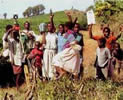 |
 |
 |
 |
 |
 |
 |
 |
 |
 |
 |
 |
 |
 |
 |
| |
| | 1 - 7 of 7 titles |  |
 |
| GLTN Participates in International Federation of Surveyors / World Bank Conference in Washington |
|
 |
Washington, 8 Apr 09
Figure Panel at the Closing Session: Joan Kagwanja, Economic Affairs Officer, UN-Economic Commission of Africa, chair of the closing session (left), Paul van der Molen, the Netherlands, Clarissa Augustinus, UN-HABITAT, Cheryl Morden, International Fund for Agricultural Development, Jolyne Sanjak, Helge Onsrud, Norway and Alain Durand-Lasserve, France and Paul Munro-Faure, Food and Agriculture Organisation. |
 |
 |
 |
 |
| Working for a fairer world |
|
 |
Ireland, 23 Feb 09
In the context of the Irish Society of Chartered surveyors’ recent conference theme, Ireland’s Future In A Global Economy, the major question was: is the role of the surveyor changing? From a global perspective, the answer is yes. |
 |
 |
 |
 |
| Advancing the GLTN Islamic mechanism: Workshop on how to train on Islamic land law |
|
 |
Nairobi, 27 Jan 09
Twenty experts— representing academia, civil society, international development organizations and the private sector—last week concluded a GLTN Workshop in Nairobi to provide feedback on a training package on Islamic land law and discuss its wider dissemination including strategies for adapting and utilizing the package for different stakeholders. Participants from Egypt, India, Iraq, Kenya, Malaysia, Niger, Senegal, Somaliland, Tunisia and Uganda, amongst others, illustrated the diversity of the Muslim world and the need for local adaptations. |
 |
 |
 |
|
|
 |
 |
 |
|